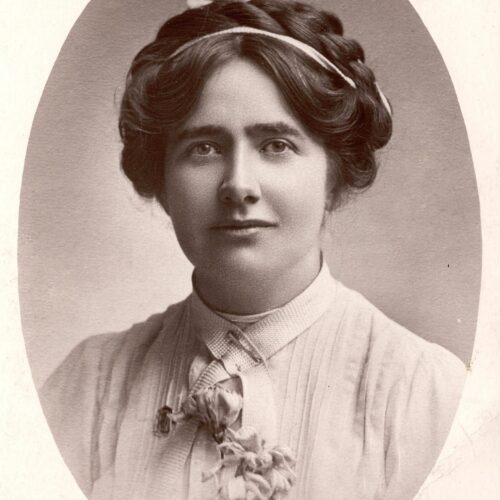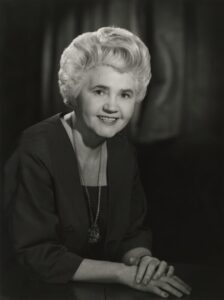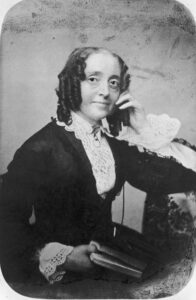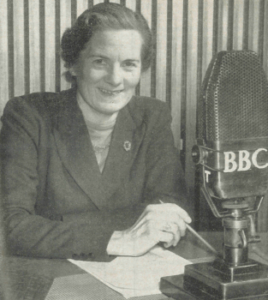

I am a feminist, a rebel, and a suffragist – a believer, therefore, in sex-equality and militant action. I desire to see woman free and human; I seek the complete emancipation from all shackles of law and custom, from all chains of sentiment and superstition.
Teresa Billington-Greig, The Militant Suffrage Movement: Emancipation in a Hurry, 1911
Active suffragette and declared agnostic Teresa Billington-Greig was a fierce advocate of women’s equality, for whom the ideals of the Ethical movement and a lifelong feminism formed the only kind of religion she could believe in. She was a founding member of the Women’s Freedom League, a suffrage organisation to which many fellow freethinkers were drawn.
I became the critic, the questioner, the flyer of the wild kites of free thought, the voice of the critic of all things great and small.
Teresa Billington-Greig, from an autobiographical fragment on her teenage years in The Non-Violent Militant: Selected Writings of Teresa Billington-Greig, eds. Carol McPhee and Ann FitzGerald (1987)
Teresa Billington was born in 1876 in Preston to a family of drapers, and raised in Blackburn, Lancashire. Despite leaving school at thirteen with no qualifications, at seventeen she trained as a pupil teacher in a Catholic school in Manchester. Renouncing this faith, and confirming her agnosticism, she began working for the Municipal Education School Service in a Manchester elementary school. Conflict with authorities there over her refusal to deliver the prescribed religious instruction, led to Billington meeting Emmeline Pankhurst, a member of the Education Committee. With her help, Billington obtained a role at a Jewish school, where her refusal to provide religious education was no issue.
In 1904, Billington founded the Manchester branch of the Equal Pay League, ‘the first feminist pressure group within the National Union of Teachers’. Around this time she also joined the Women’s Social and Political Union (WSPU), shortly after its founding, and acted as honorary secretary of the Associates of Ancoats University Settlement. In support of female suffrage, she delivered lectures at a variety of radical and unorthodox institutions – including ethical societies, trade unions, and Socialist Sunday Schools. From 1905, she became a full-time organiser for the Independent Labour Party: the first woman to be appointed to the role.
In 1906, Billington became a paid organiser for the WSPU, and worked with Annie Kenney to build up its national headquarters in London, as well as ensuring the success of its first public demonstration in Trafalgar Square on 19 May. A month later, in June 1906, Billington led a deputation to Asquith’s house in Cavendish Square, during which she was arrested and sentenced to two months’ imprisonment in Holloway. In October, she was arrested again in the course of a demonstration at the opening of parliament, and sentenced to another two months’.
In 1907, Billington married Frederick Lewis Greig in Glasgow, and in the same year resigned from her role as a paid organiser with the WSPU over increasing conflict with the Pankhursts. After Emmeline Pankhurst tore up the WSPU’s draft constitution and declared herself the organisation’s ‘dictator’, Billington-Greig held the Annual General Conference as scheduled and there, with Charlotte Despard, founded the Women’s Freedom League (WFL). Increasing support for militancy within the WFL led to her resignation at the end of 1910, from which time she advertised her services as a ‘Lecturer and Debater on a wide range of subjects – Literary, Philosophical, Economic, Political, feminist, Ethical, and Rationalist.’
Throughout her years of campaigning and lecturing, Billington-Greig formulated a clear set of demands, which centred on absolute equality between the sexes, and a rejection of ‘bad tactics even for good ends’. In 1914, she wrote in support of birth control, controversial even within progressive movements. Billington-Greig returned to the WFL in 1937, transforming it into Women for Westminster in 1945, and merging with the National Women Citizens’ Association in 1948. Billington-Greig died on 21 October 1964.
Following her death, The Ethical Record printed a short obituary for Teresa Billington-Greig:
We have heard with regret that the following members have recently died: Mrs. Billington-Greig (who was the first of the suffragettes to go to prison for her political activities)… The obituary on Mrs. Billington-Greig which appeared in The Times of October 22 dealt mainly with her suffragette activities and her writings promoting the emancipation of women. She was known as “the woman with the dog whip” from her habit of waving a whip around her head to avoid being ejected from meetings while she was making her unsolicited speeches. Brought up as a Roman Catholic, she became a member of S.P.E.S. some years ago, and spoke on several occasions at our Sunday socials. We have lost a splendid speaker and a real personality.
Ethical Record, December 1964
The Women’s Suffrage Movement: A Reference Guide 1866-1928 by Elizabeth Crawford
The Militant Suffrage Movement: Emancipation in a Hurry by Teresa Billington-Greig (1911)
The Non-Violent Militant: Selected Writings of Teresa Billington-Greig, edited by Carol McPhee and Ann FitzGerald (1987)

Nina Spiller was a lifelong worker for women’s rights, who played an active role in the humanist movement for more […]

The Open University was founded in 1969 with the ambition of providing access to higher education for people who had […]

Emancipation from every kind of bondage is my principle. I go for the recognition of human rights, without distinction of […]

The Humanist Broadcasting Council was established in 1959, in consultation with the BBC, to advocate for the inclusion of humanist […]